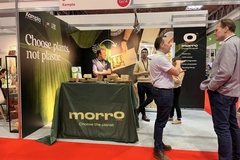
- Industry news
Industry news
- Category news
- Reports
- Key trends
- Multimedia
Multimedia
- Journal
- Events
- Suppliers
- Home
- Industry news
Industry news
- Category news
- Reports
- Key trends
- Multimedia
Multimedia
- Events
- Suppliers
Doritos sends chips to space in glow-in-the-dark packaging aboard SpaceX mission
21 Aug 2024 --- Doritos is launching its Cool Ranch Zero Gravity Flavored Tortilla Chip to space aboard a SpaceX Dragon. The “made-for-space” Doritos were specially formulated with an oil-based coating to keep the zesty Cool Ranch flavor from floating away, so astronauts can consume the snack in zero gravity.
The chips are being produced as minis, designed to be eaten in one bite aboard the Polaris Dawn mission, taking place August 26–31.
NASA and other space agencies have used similar methods to ensure foods are suitable for astronaut consumption. For instance, before switching over to tortillas as a bread substitute, NASA supplied its crew members with bite-sized bread cubes.
Even today, astronauts on the International Space Station (ISS) use peppered oil and salt water for flavoring, instead of dry spices.

St. Judes partnership
Doritos has partnered with St. Jude Children’s Research Hospital, offering consumers a chance to try the limited-edition chips and claim other rewards upon donating to its benefactor.
.jpg) Doritos Cool Ranch Zero Gravity Flavored Tortilla Chips.“We are deeply grateful to Doritos for its generous support that inspires communities and consumers everywhere to unite for a bold cause: helping treat and defeat childhood cancer,” says Richard Shadyac, president and CEO of ALSAC, the fundraising and awareness organization for St. Jude Children’s Research Hospital.
Doritos Cool Ranch Zero Gravity Flavored Tortilla Chips.“We are deeply grateful to Doritos for its generous support that inspires communities and consumers everywhere to unite for a bold cause: helping treat and defeat childhood cancer,” says Richard Shadyac, president and CEO of ALSAC, the fundraising and awareness organization for St. Jude Children’s Research Hospital.
“Through this partnership, Doritos and the Polaris Dawn crew are being catalysts for change by helping St. Jude raise survival rates for more of the 400,000 kids around the world with cancer every year.”
Doritos is also making a US$500,000 donation to St. Jude.
“The limitless possibilities of space inspired us to push the boundaries of what’s possible,” says Chris Bellinger, chief creative officer of PepsiCo Foods North America.
“This mission is a testament to our commitment to delivering bold experiences and flavors, even in the most unexpected places.”
In other spacefaring developments, space researchers earlier this year successfully grew lettuce under conditions that imitated the weightless environment aboard the ISS.
The University of Delaware, US, scientists exposed the plants to simulated microgravity by rotation, discovering that these plants, under the manufactured microgravity, were actually more prone to infections from a human pathogen, Salmonella.












